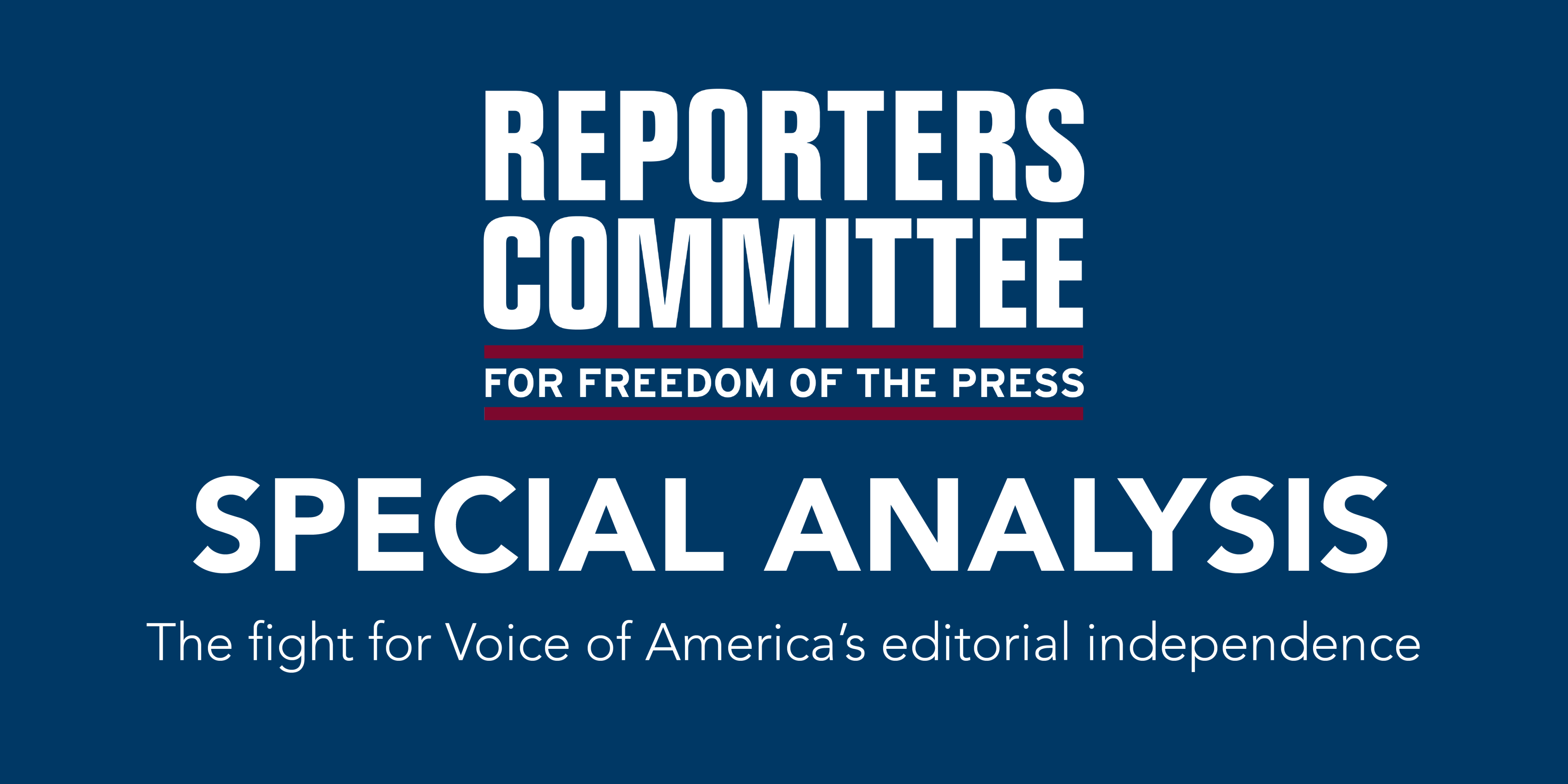Lawsuit highlights potential threats to independence at U.S. international broadcasters

Voice of America was founded during World War II to counter Nazi propaganda. From its start, VOA has been a hard news organization, and, quite deliberately, not a Ministry of Truth. Today, federal law protects its independence and that of its sister broadcasters like Radio Free Europe/Radio Liberty from political pressure through a statutory “firewall.”
That firewall is essential to U.S. international broadcasters’ ability to lead by example in carrying out their mission of promoting democracy and freedom of the press across the globe. Based on the quality of their reporting, these broadcasters have become some of the most trusted sources of news around the world. But recent moves to replace the officers and directors at several of these organizations raise concerns that the White House may be trying to breach the firewall, and a recent lawsuit highlights that potential threat.
On June 17, the new CEO of the U.S. Agency for Global Media, Michael Pack, fired the top officers and directors of Radio Free Europe, Radio Free Asia, the Middle East Broadcasting Networks and the Open Technology Fund, which supports anti-censorship technology used by journalists around the world. Two days before, VOA Director Amanda Bennett and Deputy Director Sandy Sugawara resigned in advance of Pack taking office.
Pack announced plans to replace members of the previously independent boards of the international broadcasters and OTF with various sitting administration officials. He further ordered a freeze of the federal grants that enable the private, nonprofit organizations funded through USAGM to do their work. OTF and several of the fired board members have now sued Pack in the U.S. District Court for the District of Columbia alleging that the firings were unlawful and seeking a temporary restraining order to prevent those firings from taking effect.
As the Reporters Committee wrote in recent letters responding to President Donald Trump’s attacks on Voice of America for its coverage of the COVID-19 crisis, “any attempt by government officials to interfere with the independence of publicly funded media raises the specter of state control and coercion, which should be anathema to all Americans.”
The legal firewall that protects the independence of publicly funded media is in place precisely so that U.S. international broadcasting is not seen as propaganda by viewers, listeners and readers around the world. Rather, the animating principle behind publicly funded international broadcasting is that an objective, unbiased, editorially independent international broadcaster — one that is free to report critically about the United States itself — is a stronger tool of public diplomacy than state-controlled media.
The legal firewall has several components. VOA’s charter, drafted in 1960 and signed into law under President Gerald Ford in 1976, mandates that the organization’s news will be “accurate, objective, and comprehensive” and that it will not represent any “single segment of American society.” It must present “a balanced and comprehensive projection of significant American thought and institutions.”
Second, the 1994 International Broadcast Act, signed by President Bill Clinton, set out a series of standards and principles for U.S. international broadcasters when it consolidated authority over non-military U.S. international broadcasting under the U.S. Information Agency and the new Broadcasting Board of Governors, which was then a component of the USIA.
For instance, broadcasting must “be conducted in accordance with the highest professional standards of broadcast journalism” and broadcasters must produce “news which is consistently reliable and authoritative, accurate, objective, and comprehensive.” The 1994 law also mandated that the director of the USIA and the BBG “respect the professional independence and integrity” of the U.S. international broadcasting services. When the administration of U.S. international broadcasting moved to the BBG and the USIA was abolished in 1998, Congress retained that language unchanged (save for substituting the Secretary of State for the director of the USIA).
Third, the National Defense Authorization Act for 2017, which created the USAGM and vested administrative authority over U.S. international broadcasters in the chief executive officer of the USAGM, again retained the requirement that the administrators of U.S. international broadcasting “respect the independence and integrity” of the broadcasting services. That requirement is codified in federal statute.
And finally, regulations further protect the independence of the broadcasting services. For instance, a regulation aptly titled “Firewall and Highest Standards of Professional Journalism” provides that no “person within the Executive Branch” may attempt to “direct, pressure, coerce, threaten, interfere with, or otherwise impermissibly influence” the broadcasters, “including their leadership, officers, employees, or staff,” in the “performance of their journalistic and broadcasting duties.”
Taken together, these elements of the firewall are essential protections for publicly funded media’s editorial independence, particularly when reporting on high-profile, politically sensitive stories. The firewall has allowed U.S. international broadcasters to become trusted news sources around the world — particularly in countries with state-controlled media or widespread censorship.
“The long-range interests of the United States are served by communicating directly with the peoples of the world by radio,” reads VOA’s charter. “To be effective, the Voice of America must win the attention and respect of listeners.”
Legal and structural protections, like the firewall, are essential to protecting the independence of all publicly funded media. To the extent that firewall is under threat, the courts and Congress must shore it up against undue political pressure.
The Reporters Committee regularly files friend-of-the-court briefs and its attorneys represent journalists and news organizations pro bono in court cases that involve First Amendment freedoms, the newsgathering rights of journalists and access to public information. Stay up-to-date on our work by signing up for our monthly newsletter and following us on Twitter or Instagram.